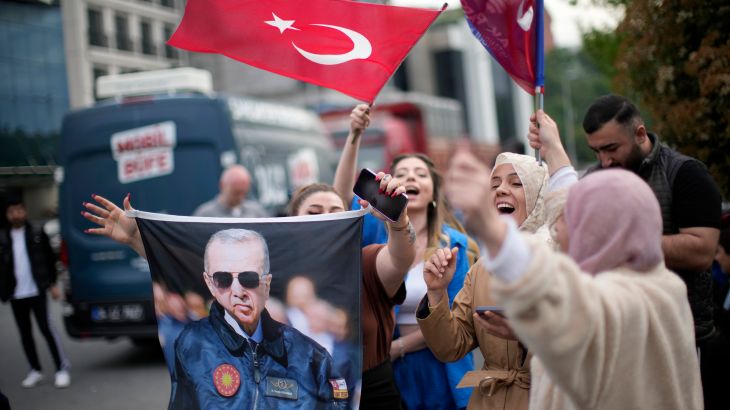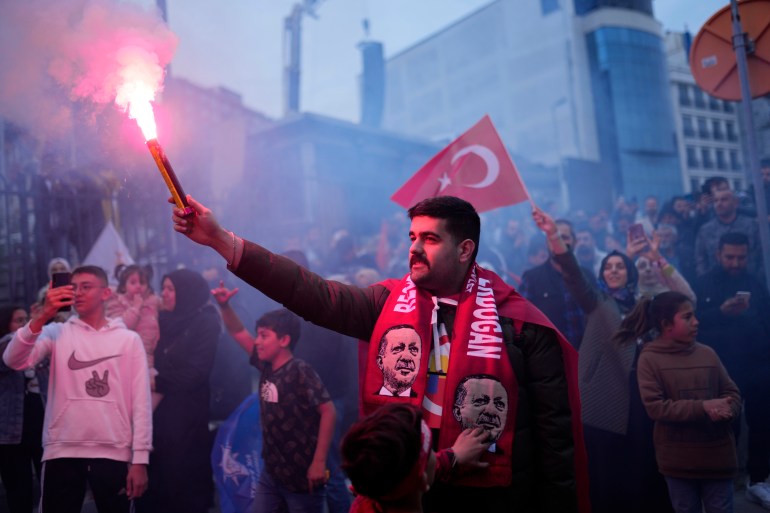Erdogan defies ‘politicised’ opinion polls in Turkey’s election
Observers surprised after results show president leading his rival Kemal Kilicdaroglu by more than four percentage points in the first round.

Days before Turkey headed into the most consequential presidential election in its modern history, most opinion polls showed President Recep Tayyip Erdogan trailing behind opposition leader Kemal Kilicdaroglu.
However on Sunday, observers and voters alike were left confounded after results showed Erdogan leading his rival by a healthy margin.
Keep reading
list of 3 itemsTurkey election results 2023 by the numbers
Turkey parties squabble as crucial vote count seesaws
With more than 99 percent of votes counted, Justice and Development Party (AK Party) leader Erdogan had received 49.51 percent of the vote, electoral chief Ahmet Yener said.
Kilicdaroglu, leader of the Republican People’s Party (CHP), had secured 44.89 percent, according to Yener, citing results from the Supreme Election Council.
Because neither candidate received more than 50 percent of the vote, a run-off will take place on May 28.
Sonar Cagaptay, a senior fellow of the Washington Institute, said the results confounded expectations. “Erdogan pulling some 3 percentage points ahead or more, … that’s surprising,” he told Al Jazeera from the capital, Ankara.
🇹🇷🗳️
Massive victory for Erdogan on Sunday. Surprise win in parliamentary elections to retain the AKP-led alliance's majority & the outcome of the president election put Erdogan in pole position to secure re-election in a run-off on 28 May. 1/2 pic.twitter.com/vCjAu4mJgd
— Emre Peker (@EPspin) May 15, 2023
In a survey conducted on May 6-7, reputable pollster Konda had put support for Kilicdaroglu at 49.3 percent and 43.7 percent for the 69-year-old incumbent.
Another survey by the political research company Gezici showed Kilicdaroglu leading Erdogan by 1 point with 46.9 percent supporting the 74-year-old opposition leader.
Al Jazeera’s Sinem Koseoglu, reporting from Istanbul, said polls in general, were not very reliable in Turkey.
“Before the election, many pollsters were criticised and accused of showing their affiliated party or leader ahead,” she said. “In a way, this [election] shows us pollsters are politicised, … and they try to influence voters.”
A face-to-face survey conducted May 10-11 of nearly 4,000 people by the Orc agency predicted an outright win in the first round for the CHP candidate with 51.7 percent support.
On Thursday, after the leader of the Homeland Party, Muharram Ince, withdrew from the presidential race, it was widely expected that this would boost the chances of Kilicdarogolu and his six-party Nation Alliance. Ince remained on the ballots and received 0.44 percent of Sunday’s vote.

One of the few polls that predicted a win for Erdogan was Optimar, seen by many as a government-leaning agency. It predicted the president would win an outright majority of 50.4 percent.
Sinan Ogan from the ATA Alliance, the third candidate, received 5.17 percent of the vote in a surprise to observers. Most polls had the nationalist leader securing 2 to 4 percent.
Ogan is likely to play a crucial rule in the run-off as both Erdogan and Kilicdarogolu will try to court his support – and his votes.
‘Loyalties not shaken’
Opposition voters expressed dismay and disbelief after Erdogan’s performance in the first round.
Sunday’s presidential and parliamentary polls presented the biggest challenge in Erdogan’s 20 years as leader of Turkey. He has not lost an election since 1994 when he became mayor of Istanbul.
The elections were held in the midst of a deepening cost-of-living crisis and rampant inflation.
Many believed the February earthquakes in southeastern Turkey would erode Erdogan’s popularity after fierce criticism of his government’s response to the disaster and its failure to enforce building regulations. Erdogan’s critics charged that these factors were responsible for the deaths of more than 50,000 people.
Reporting from Gaziantep, Al Jazeera’s Zeina Khodr said the southern provinces continued to show support for Erdogan’s alliance.
“These are traditionally its [AK Party] strongholds, provinces that were hit hard by the earthquake, so people’s loyalties were not shaken,” Khodr said.
“Yes, there was anger in the aftermath of the earthquakes for the government’s initial slow response. Yes, there’s still anger that the reconstruction has not begun in earnest. But the AK Party maintained its support in the region,” she said.